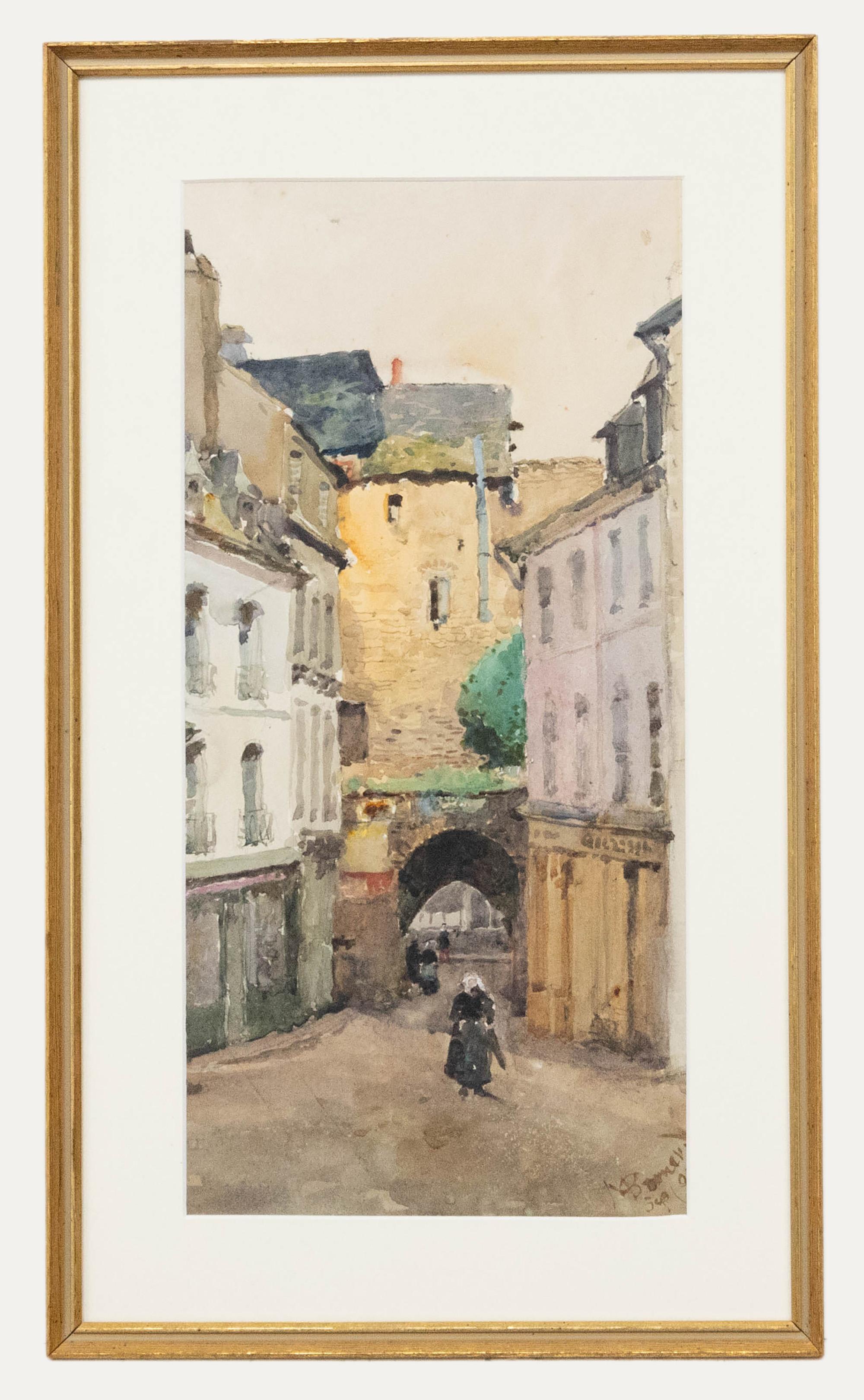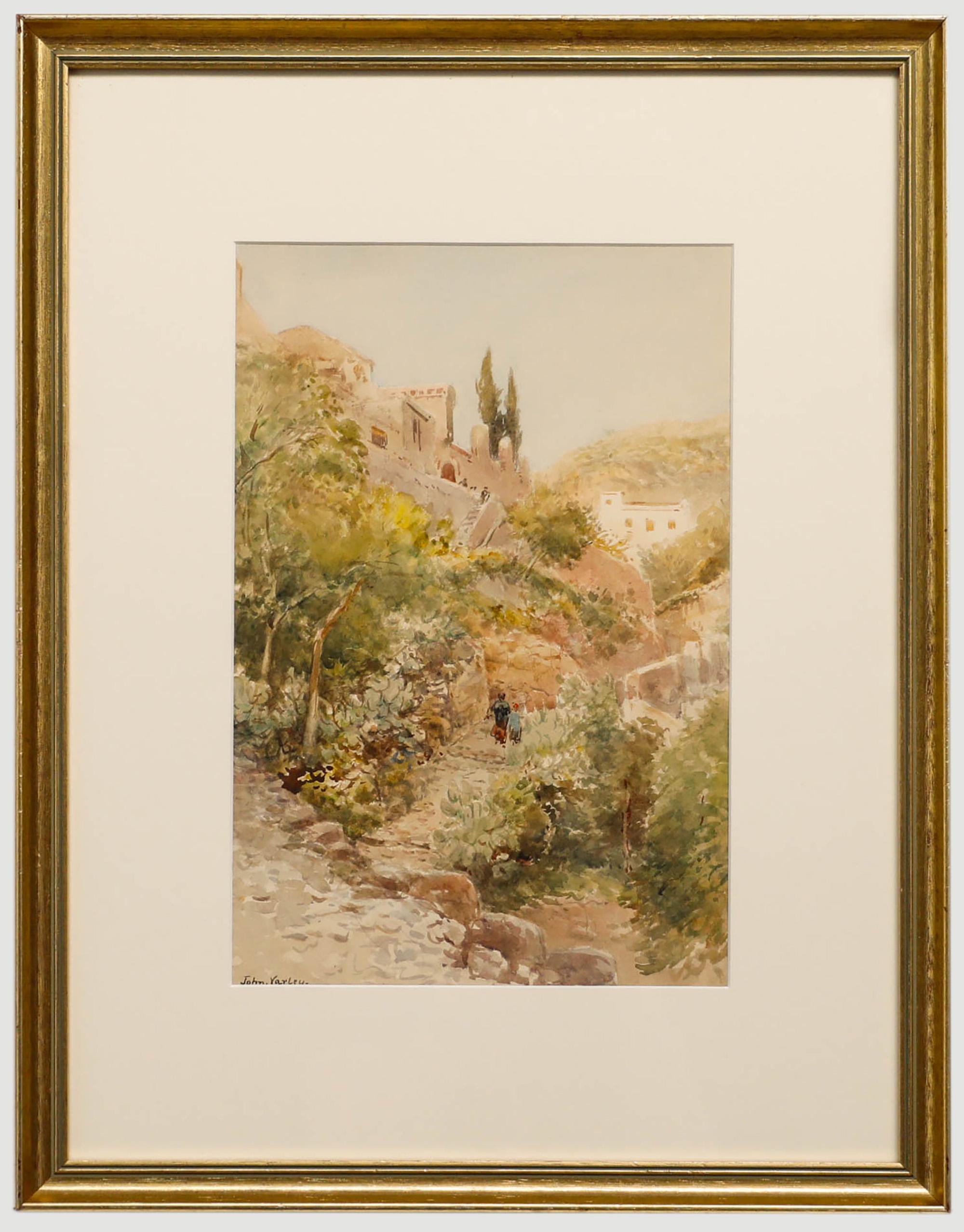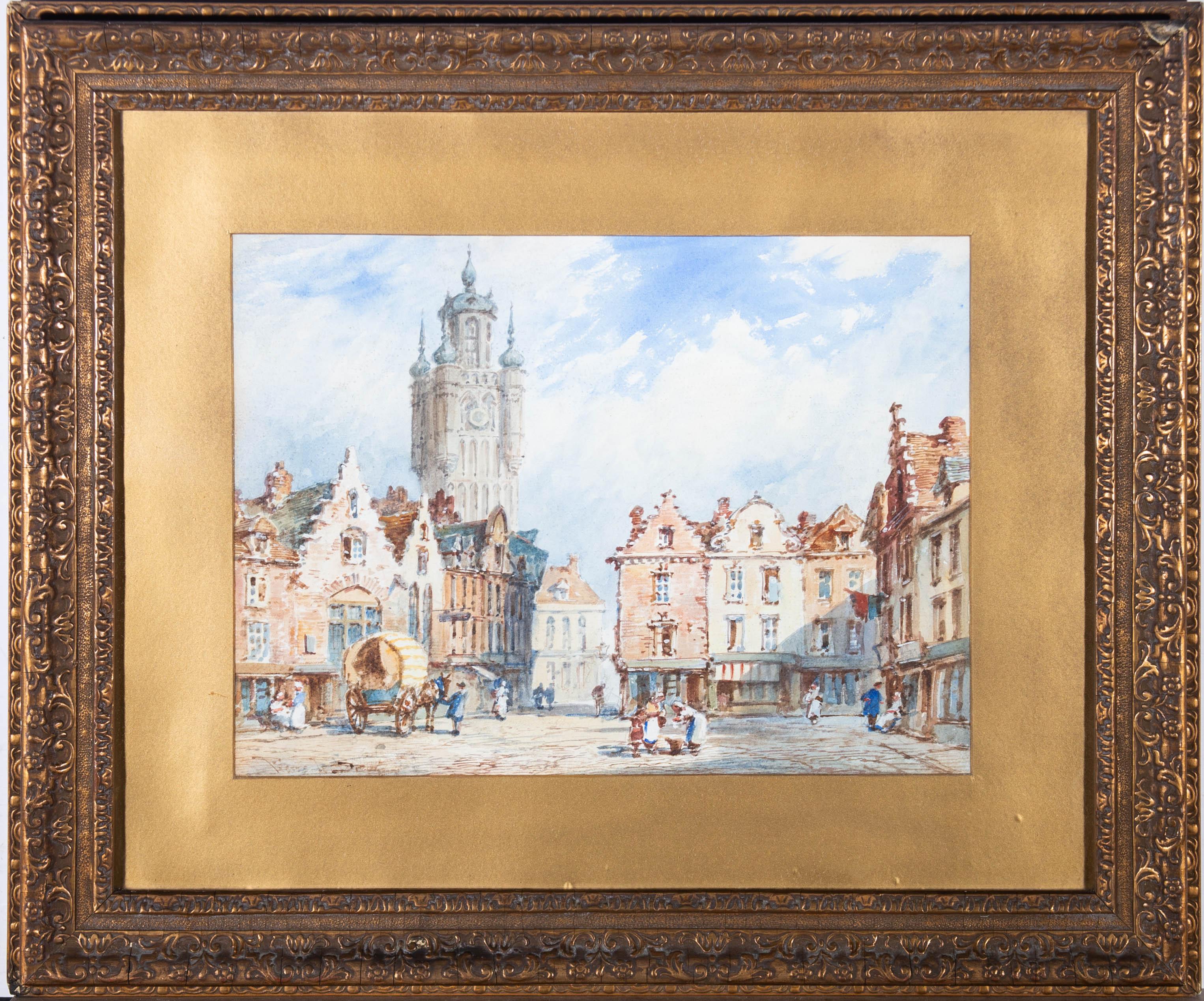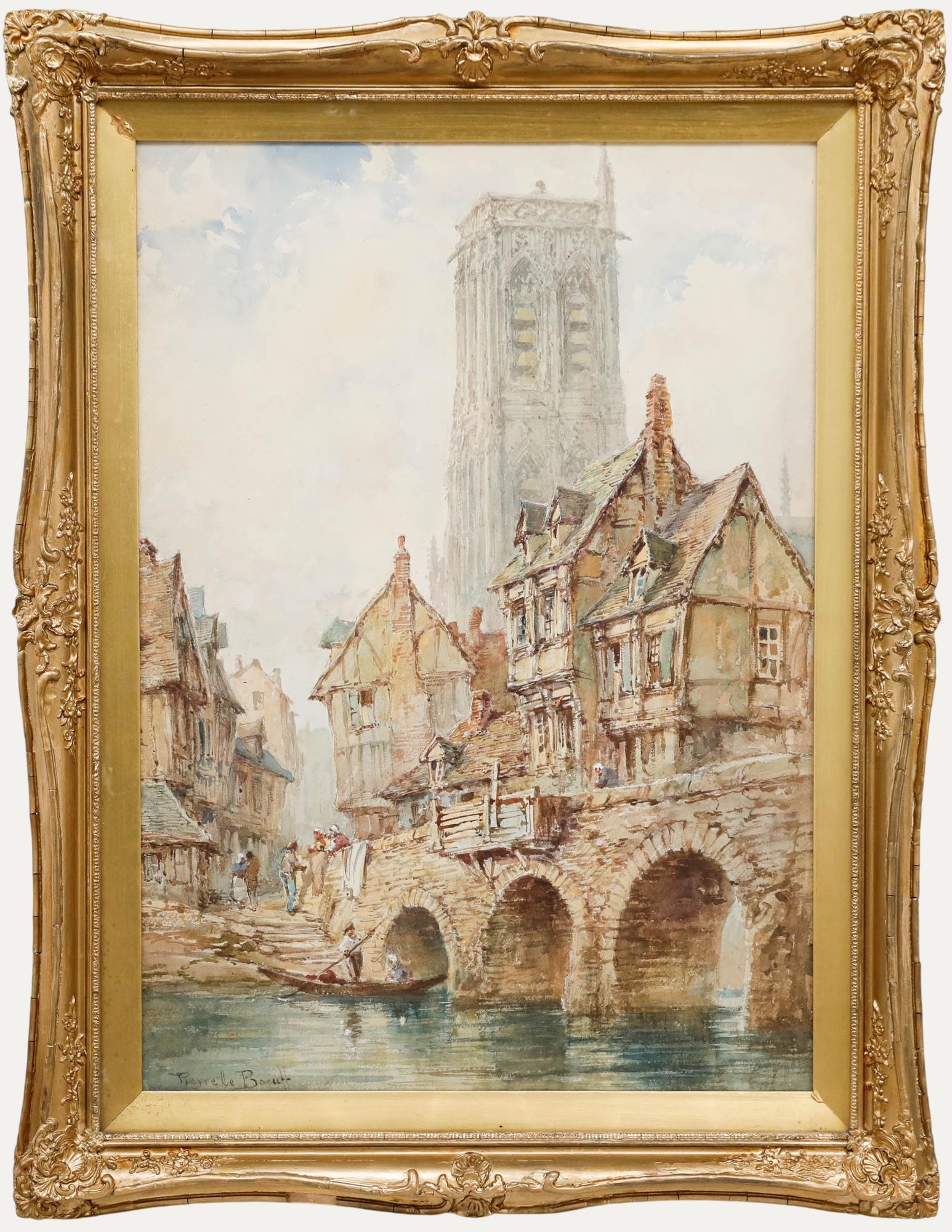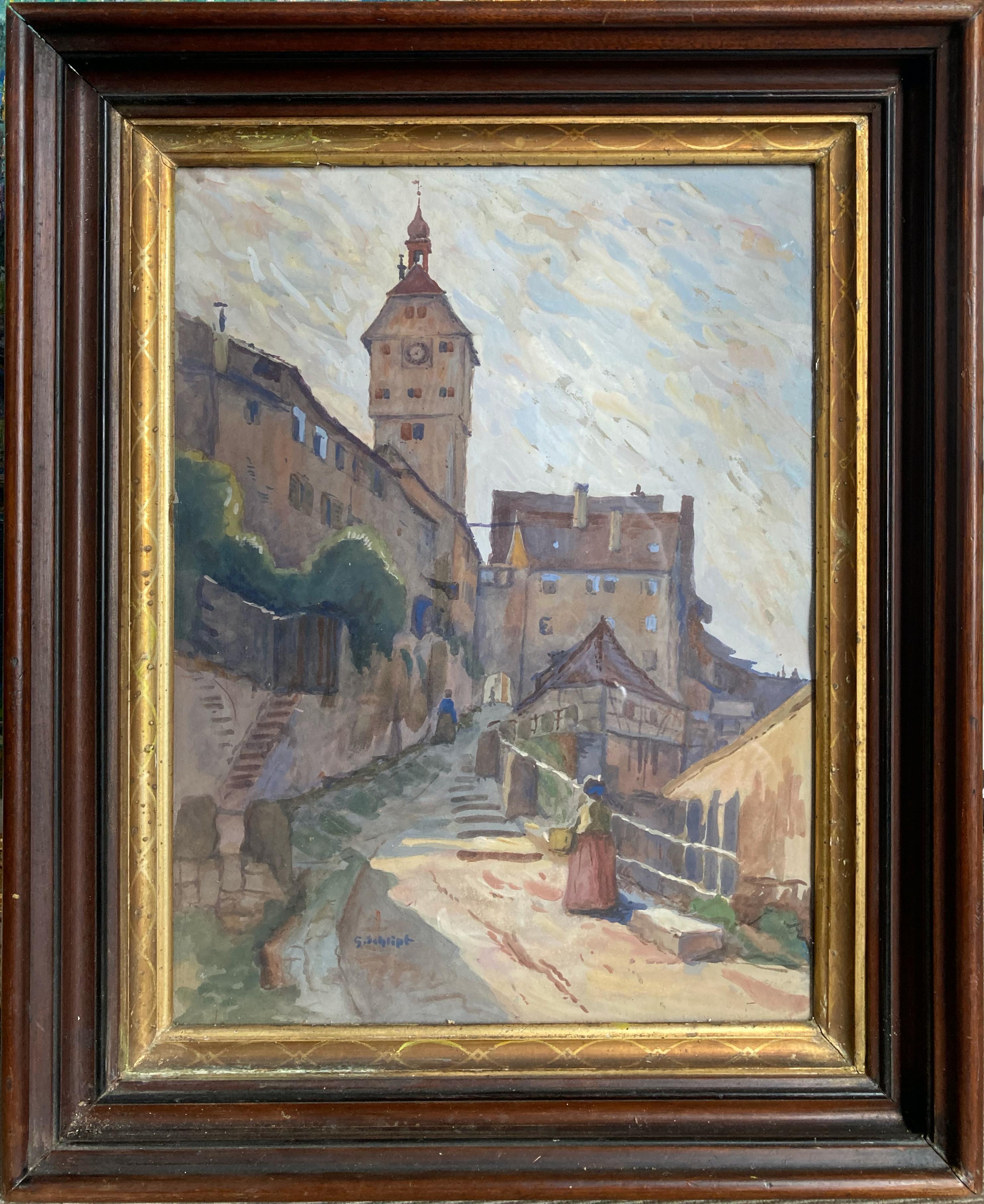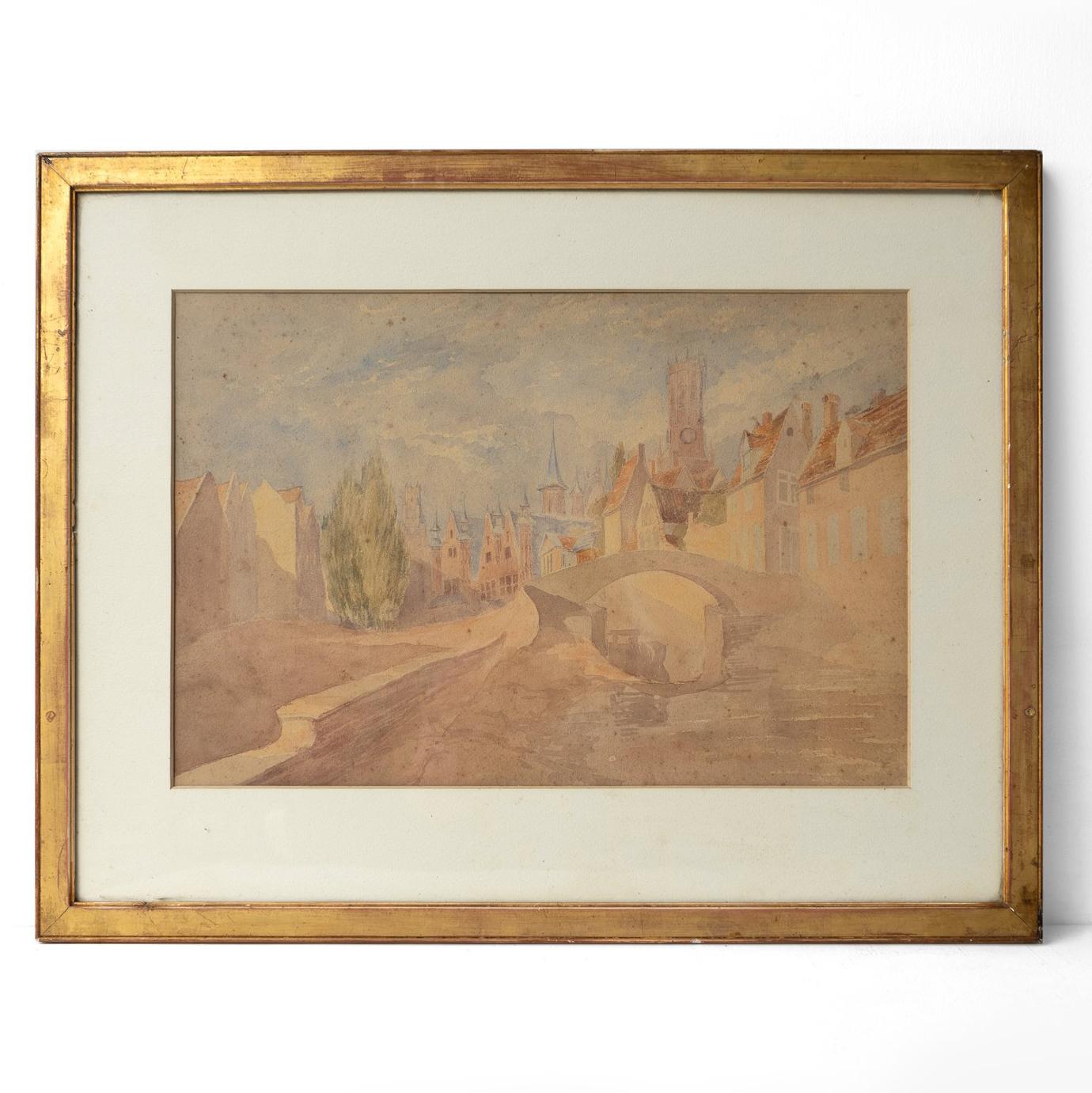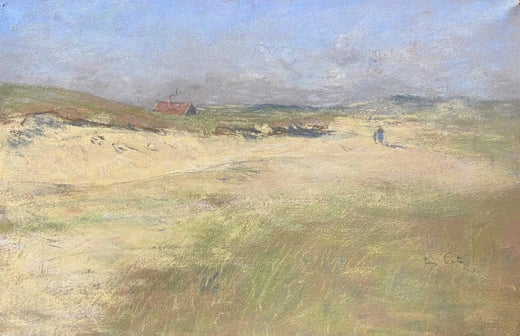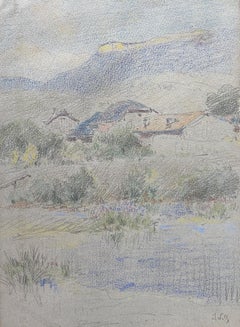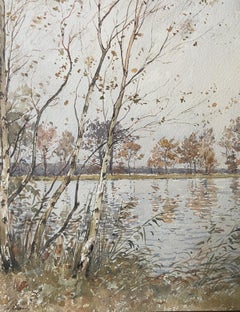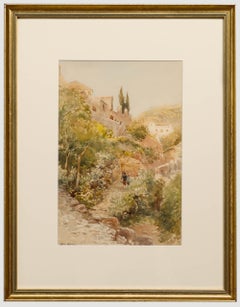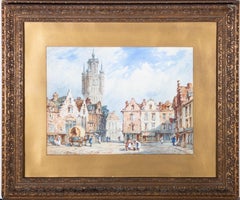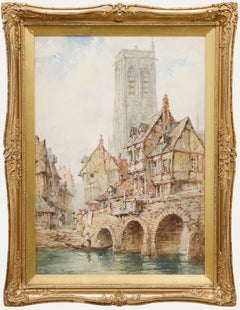Items Similar to Siebe Johannes Ten Cate (1858-1908) View of Toledo, 1896, watercolor signed
Video Loading
Want more images or videos?
Request additional images or videos from the seller
1 of 16
Siebe Johannes Ten CateSiebe Johannes Ten Cate (1858-1908) View of Toledo, 1896, watercolor signed1896
1896
$1,600.81
£1,189.53
€1,350
CA$2,215.62
A$2,467.27
CHF 1,288.22
MX$29,895.50
NOK 16,245.76
SEK 15,329.16
DKK 10,279.14
About the Item
Siebe Johannes Ten Cate (1858-1908)
A View of Toledo
Signed, located and dated lower left
Watercolor on paper
35.5 x 55 cm irregularly shaped
in good condition, some foxings in the upper part, apparent in the sky
Framed under glass : 50 x 66 cm
The subject is obviously of particular interest and bears witness to Ten Cate's travels. We are naturally reminded of El Greco's View of Toledo, and he must have had this reference in mind, but he does not adopt the Spanish painter's point of view, nor is he inspired by it. On the contrary, he gives us a very personal interpretation. The very open composition is typical of his style, which is immediately recognisable. The quality of the light is more reminiscent of Corot's Italian works.
It's also interesting to note that here he uses watercolours rather than pastels, which reinforces the impression of dryness and warmth that he manages to convey so admirably.
There's something fantastical about this landscape with these scattered silhouettes, and it has a lot to do with Ten Cate's very particular style.
Another of Ten Cate's watercolors, “Le Pont de Tolède”, painted in Toledo in 1896, is now in the Musée Leon Dierx (Saint Denis de la Réunion). It bears witness to his stay and activity in the city, and is also strikingly similar to works by Corot.
"A realist, Ten Cate pays scrupulous attention to detail, to impressions, to the hustle and bustle of crowds and the solitude of deserted places. We have spoken of variations in tone linked to the time of day and the seasons. Rainy and snowy weather, water and ice are generally chosen by the painter, who uses pastels for this purpose."
Véronique Prest in "Catalogue des pastels du Musée Carnavalet"
Siebe Johannes Ten Cate was born in Sneek (Netherlands) on 27 February 1858. His father was mayor of the town
In 1876 Siebe decided to go to the Academy of Fine Arts in The Hague and, after graduating, continued his studies in Antwerp and Brussels. At the age of twenty-two, he settled in Paris and opened his own studio.
Soon, he found himself influenced by impressionism.
He made frequent trips for inspiration, visiting England, Scandinavia, Switzerland, North Africa and North America. However, his home remained 65 rue de Malte in Paris, where he lived with his cats and dog. Ten Cate led a secluded life and devoted himself to an impressive body of work in which landscapes and cityscapes are most often immersed in an atmosphere of rain and snow.
He exhibited frequently, notably at the Salon d'Automne, but his works were not as well appreciated in the Netherlands as in France so, although he made numerous visits, he never returned there.
The French press was unstinting in its praise for Ten Cate. He was called, for example, ‘the new Jongkind’. After his death, an English newspaper ran the headline ‘Sad End of a Genius’.
Museums and galleries in France began to take an interest in Siebe ten Cate's work in the 1890s.
The Louvre bought no fewer than four paintings from him, and the Musée Carnavalet even bought a good twenty. Art dealers such as Durand-Ruel and Ambroise Vollard exhibited ten Cate in their galleries alongside famous Impressionists.As a result, Ten Cate became friends with Alfred Sisley, Camille Pissaro and Vincent van Gogh. Van Gogh described Ten Cate as "a very neat man, completely dressed in black cloth".
His paintings and pastels were exhibited at the Salon d'Automne alongside those of Jean-Baptiste Corot.
His favorite subjects were landscapes, city and harbor views, often populated with figures. Le Havre was one of his favorite locations. He also made some etchings and lithographs.
He died on a Paris street from a sudden attack of "congestion". Later, there would be unsubstantiated rumors that he died of starvation, or was shot by a rival artist. For many years, his work was neglected in the Netherlands. A major retrospective was held at the Fries Scheepvaart Museum in 2012.
Unjustly forgotten for a time, he has fortunately regained the favour of art lovers, who now see him in his rightful place. His artworks are in different museums : Amsterdam (Rijksmuseum), Paris (Musée Carnavalet, Musée d'Orsay, Fondation Custodia) and Geneva (Petit Palais), Cleveland (Cleveland Museum of Art)
- Creator:Siebe Johannes Ten Cate (1858 - 1908, Dutch)
- Creation Year:1896
- Dimensions:Height: 13.98 in (35.5 cm)Width: 21.66 in (55 cm)
- Medium:
- Movement & Style:
- Period:
- Condition:
- Gallery Location:Paris, FR
- Reference Number:Seller: Inv 7711stDibs: LU1112216293412
Siebe Johannes Ten Cate
Siebe Johannes Ten Cate was born in Sneek (Netherlands) on 27 February 1858. His father was mayor of the town In 1876 Siebe decided to go to the Academy of Fine Arts in The Hague and, after graduating, continued his studies in Antwerp and Brussels. At the age of twenty-two, he settled in Paris and opened his own studio.
Soon, he found himself influenced by impressionism. He made frequent trips for inspiration, visiting England, Scandinavia, Switzerland, North Africa and North America. However, his home remained 65 rue de Malte in Paris, where he lived with his cats and dog. Ten Cate led a secluded life and devoted himself to an impressive body of work in which landscapes and cityscapes are most often immersed in an atmosphere of rain and snow.
He exhibited frequently, notably at the Salon d'Automne, but his works were not as well appreciated in the Netherlands as in France so, although he made numerous visits, he never returned there.
The French press was unstinting in its praise for ten Cate. He was called, for example, ‘the new Jongkind’. After his death, an English newspaper ran the headline ‘Sad End of a Genius’.
Museums and galleries in France began to take an interest in Siebe ten Cate's work in the 1890s.
The Louvre bought no fewer than four paintings from him, and the Musée Carnavalet even bought a good twenty. Art dealers such as Durand-Ruel and Ambroise Vollard exhibited ten Cate in their galleries alongside famous Impressionists.As a result, ten Cate became friends with Alfred Sisley, Camille Pissaro and Vincent van Gogh. Van Gogh described Ten Cate as "a very neat man, completely dressed in black cloth". His paintings and pastels were exhibited at the Salon d'Automne alongside those of Jean-Baptiste Corot.
His favorite subjects were landscapes, city and harbor views, often populated with figures. Le Havre was one of his favorite locations. He also made some etchings and lithographs.
He died on a Paris street from a sudden attack of "congestion". Later, there would be unsubstantiated rumors that he died of starvation, or was shot by a rival artist. For many years, his work was neglected in the Netherlands. A major retrospective was held at the Fries Scheepvaart Museum in 2012.
Unjustly forgotten for a time, he has fortunately regained the favour of art lovers, who now see him in his rightful place. His artworks are in different museums : Amsterdam (Rijksmuseum), Paris (Musée Carnavalet, Musée d'Orsay, Fondation Custodia) and Geneva (Petit Palais), Cleveland (Cleveland Museum of Art)
About the Seller
5.0
Gold Seller
Premium sellers maintaining a 4.3+ rating and 24-hour response times
Established in 2018
1stDibs seller since 2019
251 sales on 1stDibs
Typical response time: <1 hour
- ShippingRetrieving quote...Shipping from: Paris, France
- Return Policy
Authenticity Guarantee
In the unlikely event there’s an issue with an item’s authenticity, contact us within 1 year for a full refund. DetailsMoney-Back Guarantee
If your item is not as described, is damaged in transit, or does not arrive, contact us within 7 days for a full refund. Details24-Hour Cancellation
You have a 24-hour grace period in which to reconsider your purchase, with no questions asked.Vetted Professional Sellers
Our world-class sellers must adhere to strict standards for service and quality, maintaining the integrity of our listings.Price-Match Guarantee
If you find that a seller listed the same item for a lower price elsewhere, we’ll match it.Trusted Global Delivery
Our best-in-class carrier network provides specialized shipping options worldwide, including custom delivery.More From This Seller
View AllPaul Lecomte (1842-1920) A village street with a calvary, watercolor
By Paul Lecomte
Located in Paris, FR
Paul Lecomte (1842-1920)
A village street with a calvary
Signed lower left
Watercolor on paper
29 x 23.5cm
Framed : 46.5 x 420cm
In quite good condition, light traces of a former fr...
Category
Early 1900s Impressionist Landscape Drawings and Watercolors
Materials
Watercolor
Marie Joseph Clavel dit Iwill (1850-1923) Landscape with a village, signed
By Marie-Joseph Iwill
Located in Paris, FR
Marie Joseph Clavel dit Iwill (1850-1923)
Landscape with a village,
signed lower right
color pencils on paper
27 x 18.5 cm
In good condition, a stain visible in the upper left corner
in a modern frame : 40.5 x 32.5 cm
This delicate landscape drawn with coloured pencils shows how the artist is trying out a technique that brings him closer to pointillism, here he is part of the contemporary post impressionist movement. A rare work and particularly interesting in this respect.
Marie-Joseph Léon Clavel was the son of Frédéric Clavel (1822-1902), an economist and philanthropist, and Amélie Philippe (1822-1904). He learned painting from Emmanuel Lansyer and Karl Joseph Kuwasseg.
Spending part of his childhood in Nancy, he finished his studies at the Lycée Bonaparte in Paris. In order to satisfy his father's plans, he began his active life in the trade.
In the early days of the 1870 war...
Category
Early 1900s Landscape Drawings and Watercolors
Materials
Color Pencil
Paul Lecomte (1842-1920) L'étang à Mortefontaine, signed watercolor
By Paul Lecomte
Located in Paris, FR
Paul Lecomte (1842-1920)
L'étang à Mortefontaine, an autumn landscape
signed lower left
Watercolor on paper,
29,3 x 22.5 cm
In its original vintage frame : 46 x 39,5 cm
titled on t...
Category
1880s Impressionist Landscape Drawings and Watercolors
Materials
Watercolor
Isidore Pils (1813-1875) An Orientalist scene, signed watercolor
By Isidore Alexandre Augustin Pils
Located in Paris, FR
Isidore Pils (1813-1875)
An Orientalist scene
Signed lower left
Pencil and heightenings of watercolor on paper
15 x 24 cm
paper yellowed by time, stains and a small repaired tear on the upper right edge.
In a modern mount 40.5 x 53 cm
Isidore-Alexandre-Augustin Pils (1815–1875) was a French academic painter of religious and military subjects.
Pils was born in Paris as the son of a soldier François Pils. At the age of twelve, he studied with Guillaume Guillon-Lethière for four years.
In 1831 he became a student at the École des Beaux-Arts and studied under François-Édouard Picot.
He competed for the Prix de Rome, which he won in 1838 for a history painting, St. Peter Healing a Lame Man at the Door of the Temple.
Although in poor health, Pils then spent the customary three years at the French Academy in Rome at the Villa Medici, which then had Jean Auguste Dominique Ingres as its director. While in Italy he visited Naples, Venice, and Florence.
Pils's earlier paintings have religious themes. In 1849 he completed his most famous work, Rouget de L'Isle Singing La Marseillaise, which now resides at the Musée historique de Strasbourg. After experiences travelling with French troops through the Crimea, his themes took on military and nationalistic subjects. He later produced many military scenes during the siege of Paris during the Franco-Prussian War of 1870.
Pils was appointed professor of painting at the École des Beaux-Arts in 1863 but left the same year for two years in Algeria. In 1868 he was elected to seat #14 of the Académie des Beaux-Arts. Among his students were Adrien Moreau...
Category
1870s Academic Figurative Drawings and Watercolors
Materials
Watercolor
Attributed to Henry Ottmann (1877-1927) A Provence landscape, watercolor
By Henri Ottmann
Located in Paris, FR
Attributed to Henry Ottmann (1877-1927)
A Provence landscape,
watercolor on paper
24 x 32 cm (view)
In a modern frame : 45 x 55.5 cm
When unframed it appears the work is larger (...
Category
1920s Post-Impressionist Landscape Drawings and Watercolors
Materials
Watercolor
19th Century french school, Villefranche-sur Mer, the harbour, watercolor
Located in Paris, FR
French School circa 1850
Villefranche sur mer, the Harbour
Watercolor on paper
16 x 24 cm
In good condition
Framed 29 x 38 cm
This very fine wat...
Category
1850s Romantic Landscape Drawings and Watercolors
Materials
Watercolor
You May Also Like
Late 19th Century Watercolour - The Old City Walls
Located in Corsham, GB
Well presented in a gilt effect frame. Signed illegibly. On paper.
Category
Late 19th Century Landscape Drawings and Watercolors
Materials
Watercolor
$251 Sale Price
20% Off
John Varley Jnr (1850-1933) - Late 19th Century Watercolour, Road in Sicily
By John Varley Jnr
Located in Corsham, GB
Original watercolour. Signed to the lower left. Presented in a gilt frame. On paper.
Category
Late 19th Century Landscape Drawings and Watercolors
Materials
Watercolor
Pierre Le Boeuff (fl.1899-1920) - Early 20C Watercolour, Street View, Bergues
Located in Corsham, GB
A charming watercolour painting with gouache details, depicting a street scene in the Northern French commune of Bergues. Signed to the lower left-hand corner. Presented in a golden ...
Category
Early 20th Century Landscape Drawings and Watercolors
Materials
Watercolor
Pierre Le Boeuff (fl.1899-1920) - Late 19th Century Watercolour, Canal Scene
Located in Corsham, GB
A charming watercolour by the well listed artist Pierre Le Boeuff (fl.1899-1920) depicting a quaint continental canal scene, featuring a prominent church tower rising above charming ...
Category
Late 19th Century Landscape Drawings and Watercolors
Materials
Watercolor
"Scene in Wurttemberg" - Late 19th Century Antique Framed Watercolor Painting
Located in New Orleans, LA
I've included a photo here of the blue sticker a movie studio put on the back of this beautiful old German pastel when they rented it from my Magazine Street gallery for the shoot of...
Category
Late 19th Century Impressionist Landscape Drawings and Watercolors
Materials
Watercolor
Antique Original Edwardian Landscape Watercolour Depicting Bruges
Located in Bristol, GB
ANTIQUE ORIGINAL FRAMED BELGIAN WATERCOLOUR PAINTING
Depicting a view of Bruges, looking down the Groenerei Canal over the steep rooftops towards the dominating medieval Belfry Tower.
Painted skilfully capturing light and shade extremely well and using the negative space in the paper to great effect.
Unsigned but in the manner of Lucien Frank...
Category
Early 20th Century Belgian Paintings
Materials
Paint, Paper, Glass
